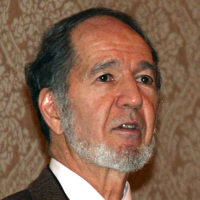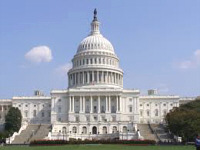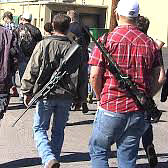

Pulitzer Prize Winning Professor Identifies
Militias as "The Enemy Within"
![]()
By Kurt Hofmann, December 31st, 2014
JPFO writer contributor, © 2014.

Professor Jared Diamond
UCLA Geography Professor Jared Diamond is considered something of an intellectual heavyweight, with a Pulitzer Prize for one of his books, and a reputation as "America's best-known geographer." In an op-ed appearing in the Los Angeles Times last Friday, Diamond warned of the "enemy within," who threatens to destroy our "democracy" (Diamond's and other "progressives'" term for our Constitutional republic).
The danger, we're told, is that the nation has become so polarized that we can agree on nothing, and so nothing gets done politically, which will (somehow) prompt "decent Americans" to tolerate "authoritarian government" as the lesser of evils, thus ushering in tyranny:
If our politicians continue to yield to pressure from extremists not to compromise and remain mired in gridlock, the majority of decent Americans may in frustration come to view an authoritarian government as the only solution to political gridlock — as a lesser evil that has to be tolerated.
Diamond seems particularly worried about gridlock, using the term six times in the single article--it's almost as if he has identified it as the biggest problem in the U.S.:
But, on the other hand, like Chileans before and under Allende, we have become stuck in political gridlock. Our citizens are split by deep disagreements about basic economic, social and political issues, including government interventions, immigration, investment in education and infrastructure, and inequality of income and opportunity. . . .
![]()
Meanwhile, our politicians have been increasingly unwilling or unable to craft compromises. The most recent Congress passed fewer laws than any Congress in decades.
 He apparently sees the passage of "fewer laws than [by] any Congress in decades," as a problem. Think about that. We are rapidly approaching the end of the 113th Congress--226 years of Congress passing hundreds of laws every year. Every year, for two and a quarter centuries, hundreds of new "you must not do this" strictures, and "you must do that" mandates. Not just Congress as a whole, but individual legislators--"lawmakers" in common parlance--are often measured by their "productivity"--the number of bills they introduce that eventually become law. The most "productive" legislator is the one who pushes through the most laws, the most restrictions on, and requirements for, the people's behavior. Sure, some bills that pass actually repeal old laws, or impose new restrictions on the government, rather than on the citizenry, but I trust no one thinks of that as the rule, rather than the exception.
He apparently sees the passage of "fewer laws than [by] any Congress in decades," as a problem. Think about that. We are rapidly approaching the end of the 113th Congress--226 years of Congress passing hundreds of laws every year. Every year, for two and a quarter centuries, hundreds of new "you must not do this" strictures, and "you must do that" mandates. Not just Congress as a whole, but individual legislators--"lawmakers" in common parlance--are often measured by their "productivity"--the number of bills they introduce that eventually become law. The most "productive" legislator is the one who pushes through the most laws, the most restrictions on, and requirements for, the people's behavior. Sure, some bills that pass actually repeal old laws, or impose new restrictions on the government, rather than on the citizenry, but I trust no one thinks of that as the rule, rather than the exception.
And sure, as technology advances, and as social mores evolve, some new restrictions on what kinds of behavior society accepts are necessary--but hundreds per year, for centuries? Technology isn't moving that fast. At what point will we decide we finally have just about enough laws, that our freedom has been sufficiently curtailed? The more closely we approach that point, the better "gridlock" looks.
But in the meantime, who are these "extremists" pressuring politicians into refusal to compromise, who is this "enemy within"?
Already, plenty of Americans are asserting the right to carry guns in previously unlikely places (such as in schools and government offices). Already, they are forming private militias for purposes such as patrolling the Mexican border and protecting a claimed right to graze cattle on federal lands. Again, when private citizen militias already carry guns for those purposes, it's "just" a matter of expanding the scope of an established principle to use guns for other purposes.
 Yep--open carry demonstrations have brought us just one step away from provoking "decent Americans" into demanding a military coup to come in and get things done, apparently. The fact that private citizens are providing the border security that the federal government refuses to provide is an indictment of the people, and not the government. That armed private citizens thwarted the government's intention to enforce cattle grazing fee laws with paramilitary force is a call for more "active" government.
Yep--open carry demonstrations have brought us just one step away from provoking "decent Americans" into demanding a military coup to come in and get things done, apparently. The fact that private citizens are providing the border security that the federal government refuses to provide is an indictment of the people, and not the government. That armed private citizens thwarted the government's intention to enforce cattle grazing fee laws with paramilitary force is a call for more "active" government.
Our only hope, according to Diamond, is for the people and the politicians to find a willingness to "compromise," in order to end the gridlock:
Americans are divided almost equally between liberals and conservatives; neither side has any reasonable hope of a quick victory if events turn violent.
Well . . . perhaps. Perhaps, on the other hand, as the late Andrew Breitbart once noted, "we have the guns," and rather like our chances "if events turn violent." He continues:
None of the issues about which Americans are now divided seems to me to approach in importance the survival of American democracy. Our issues aren't worth dying for, whereas, to the British of 1940, the consequences of a Nazi takeover were indeed worth dying for.
And that's another problem for your side, Diamond--the principles on which our republic (as opposed to your "democracy") was founded are indeed worth dying for, in the eyes of many of us, and perhaps an even bigger problem for you, worth killing for. So if you and your "decent Americans" decide to appeal to "authoritarian government" to deal with us, bring it.
 A former paratrooper, Kurt Hofmann was paralyzed in a car accident in 2002. The helplessness inherent to confinement to a wheelchair prompted him to explore armed self-defense, only to discover that Illinois denies that right, inspiring him to become active in gun rights advocacy. He also writes the St. Louis Gun Rights Examiner column. Kurt Hofmann Archive.
A former paratrooper, Kurt Hofmann was paralyzed in a car accident in 2002. The helplessness inherent to confinement to a wheelchair prompted him to explore armed self-defense, only to discover that Illinois denies that right, inspiring him to become active in gun rights advocacy. He also writes the St. Louis Gun Rights Examiner column. Kurt Hofmann Archive.
![]()




































